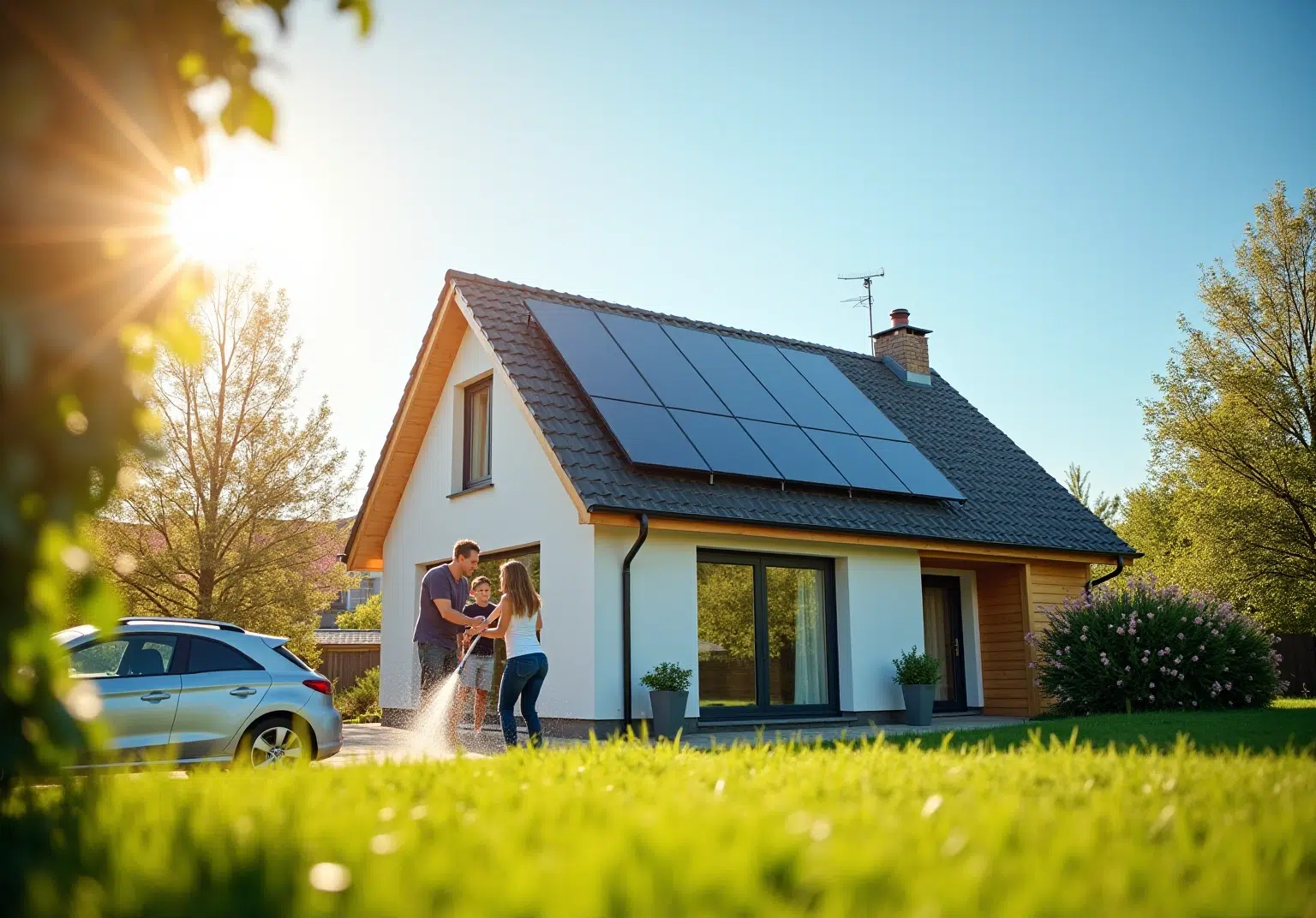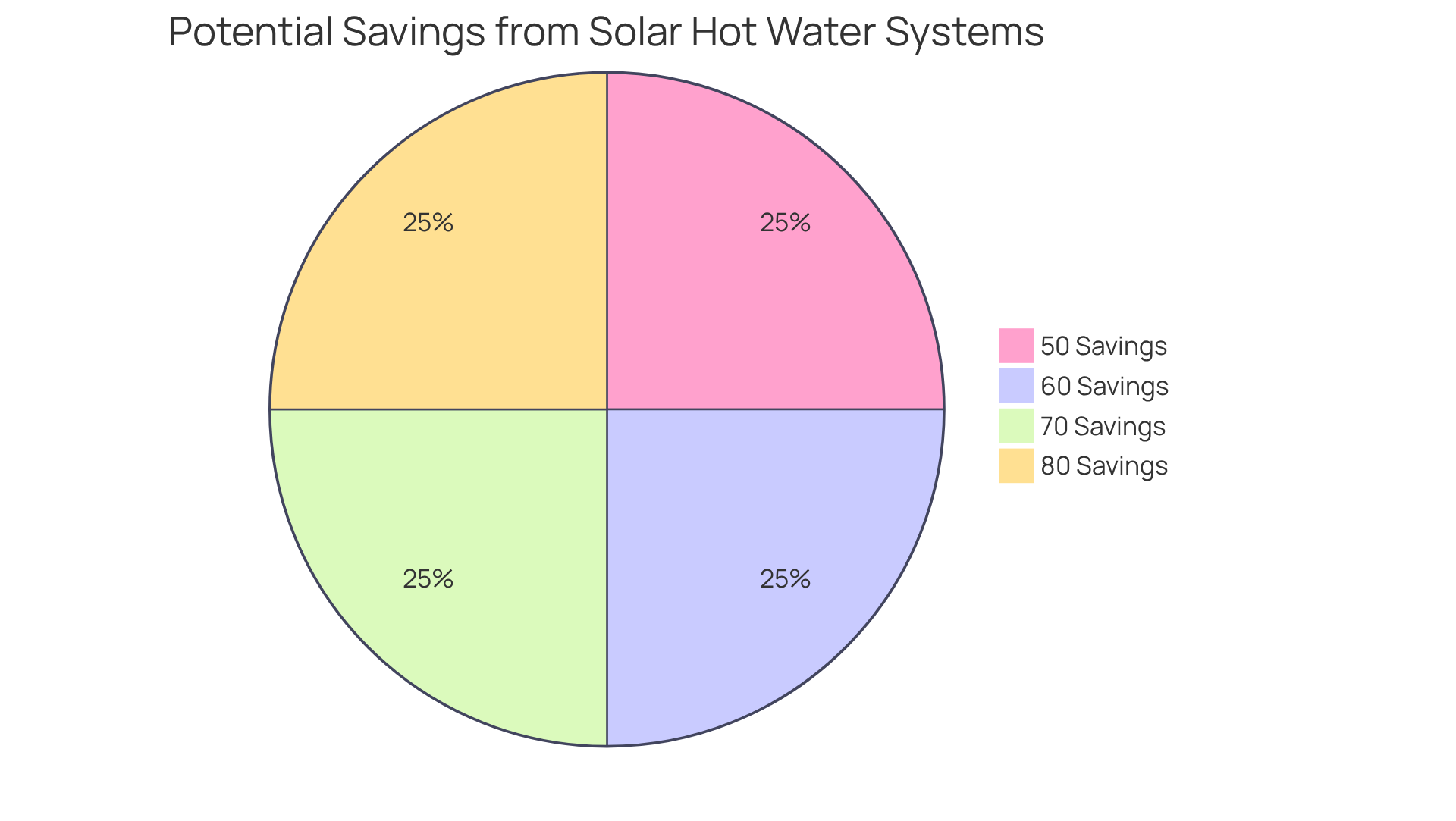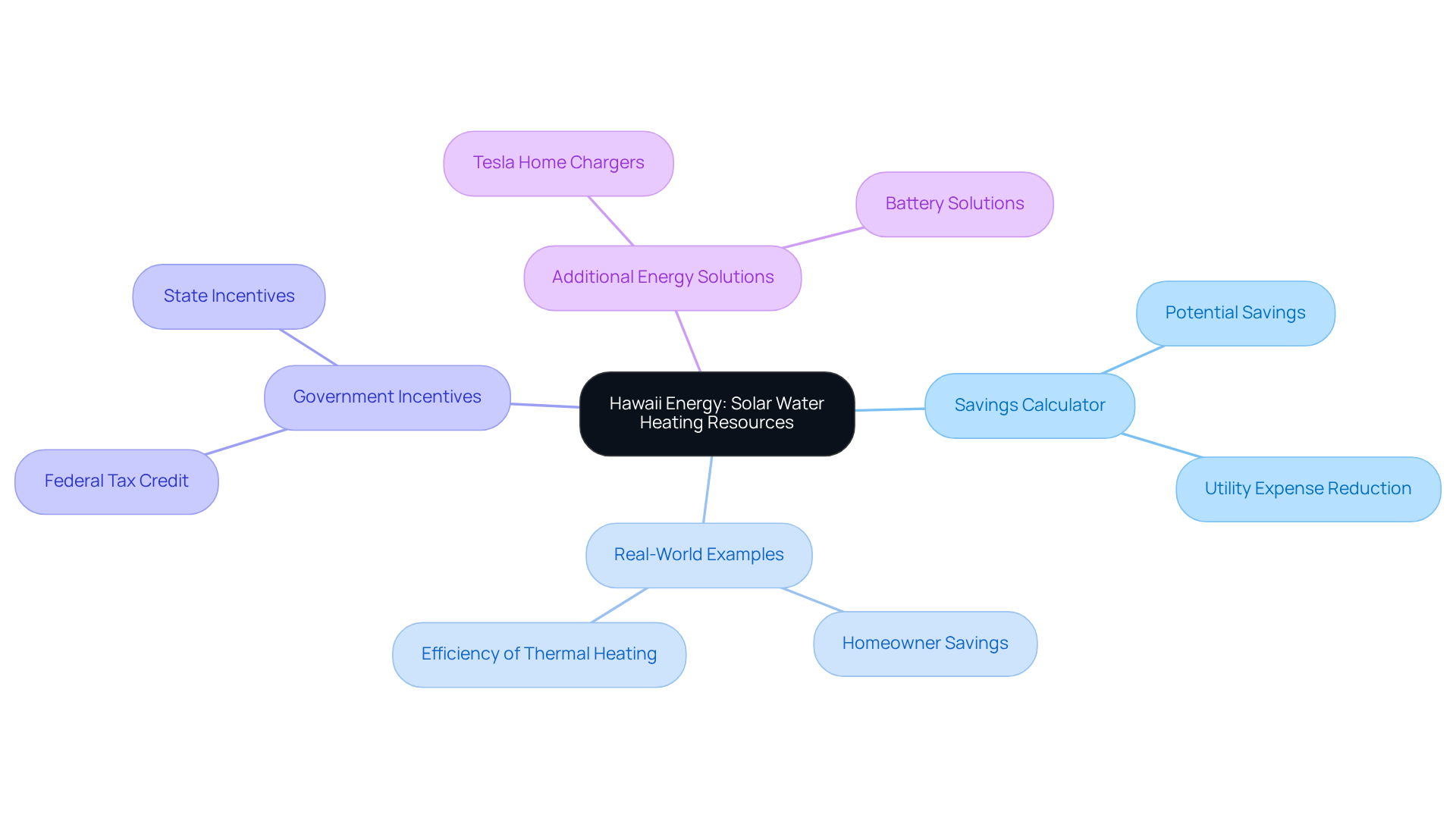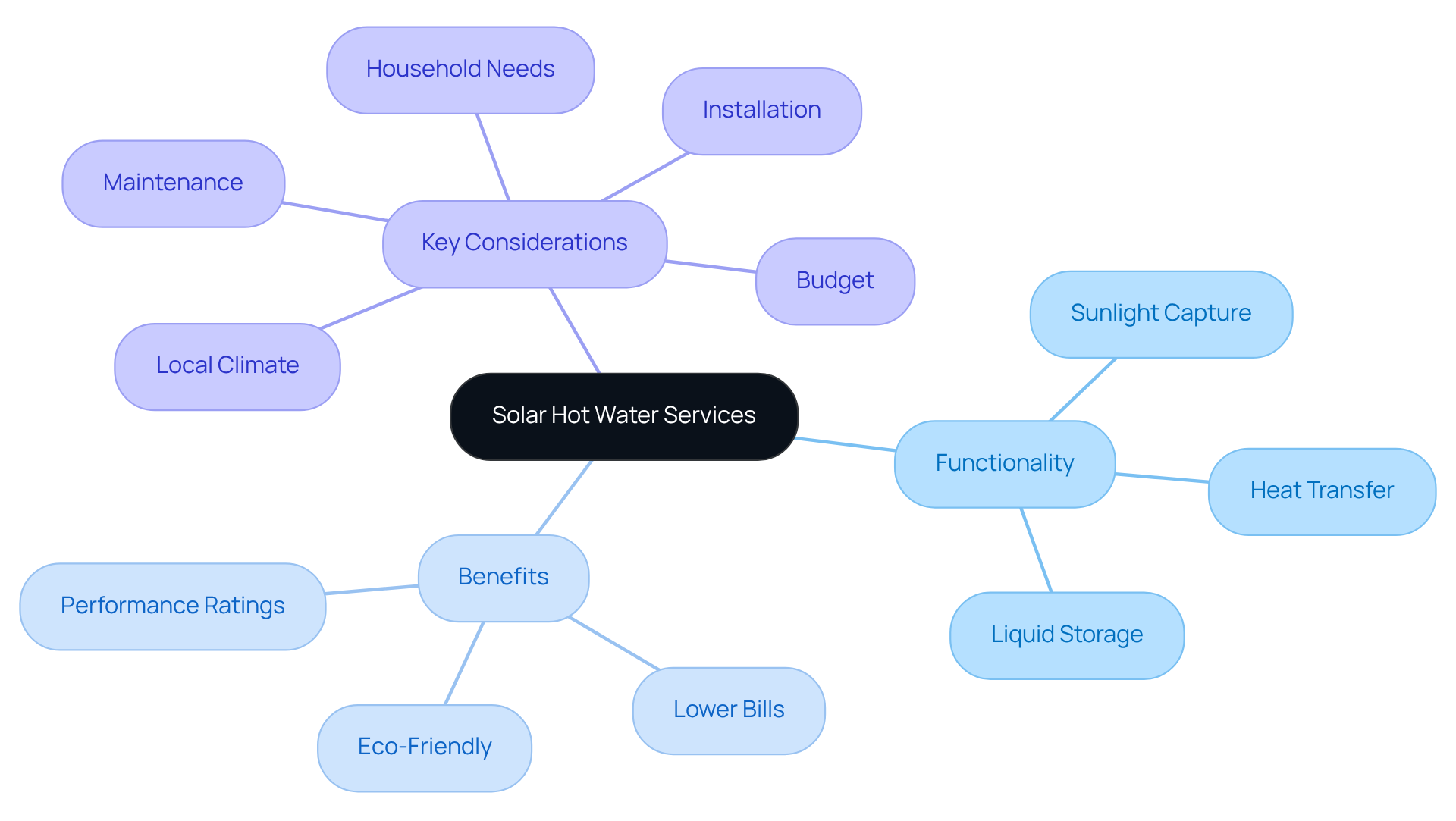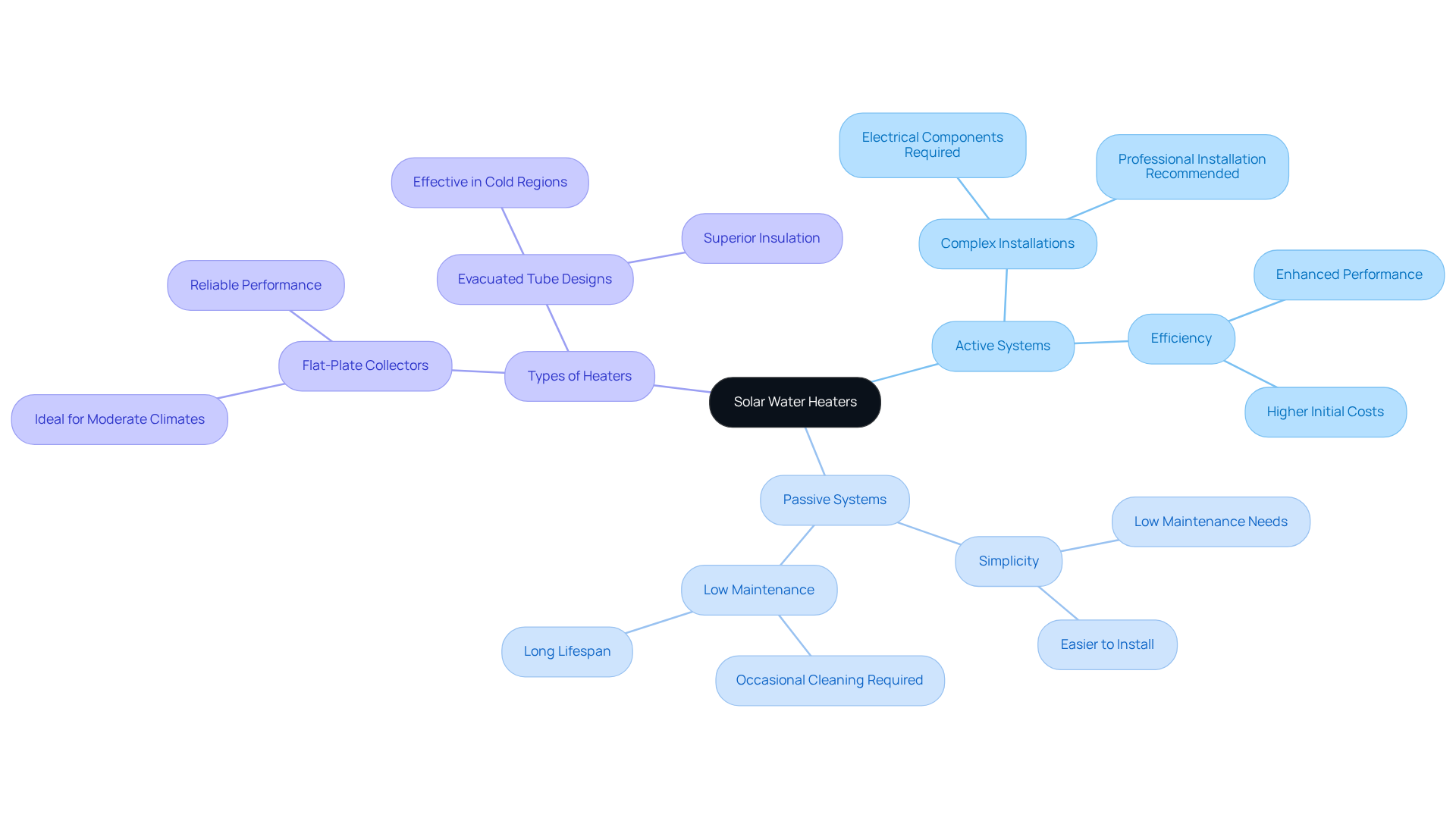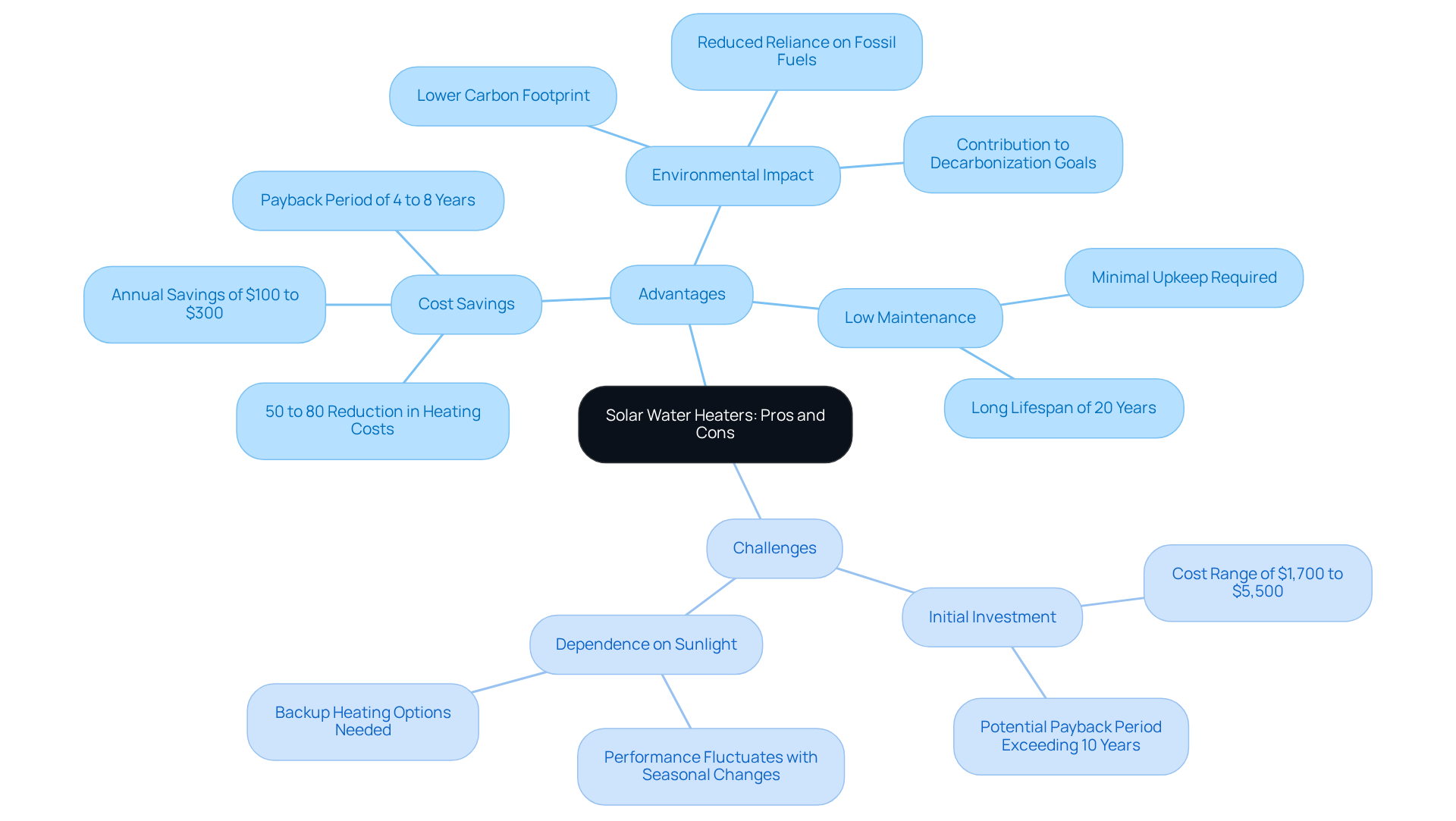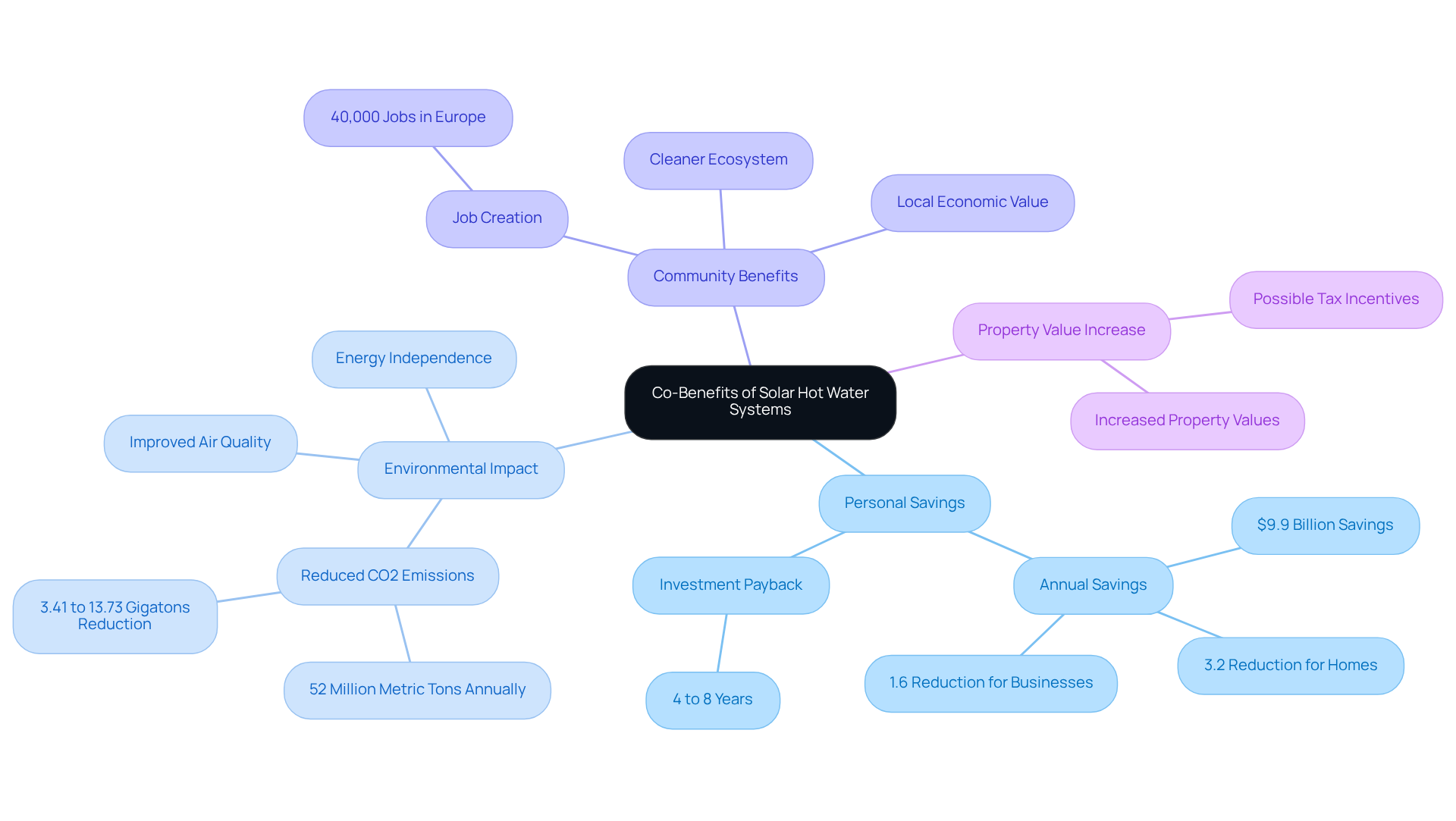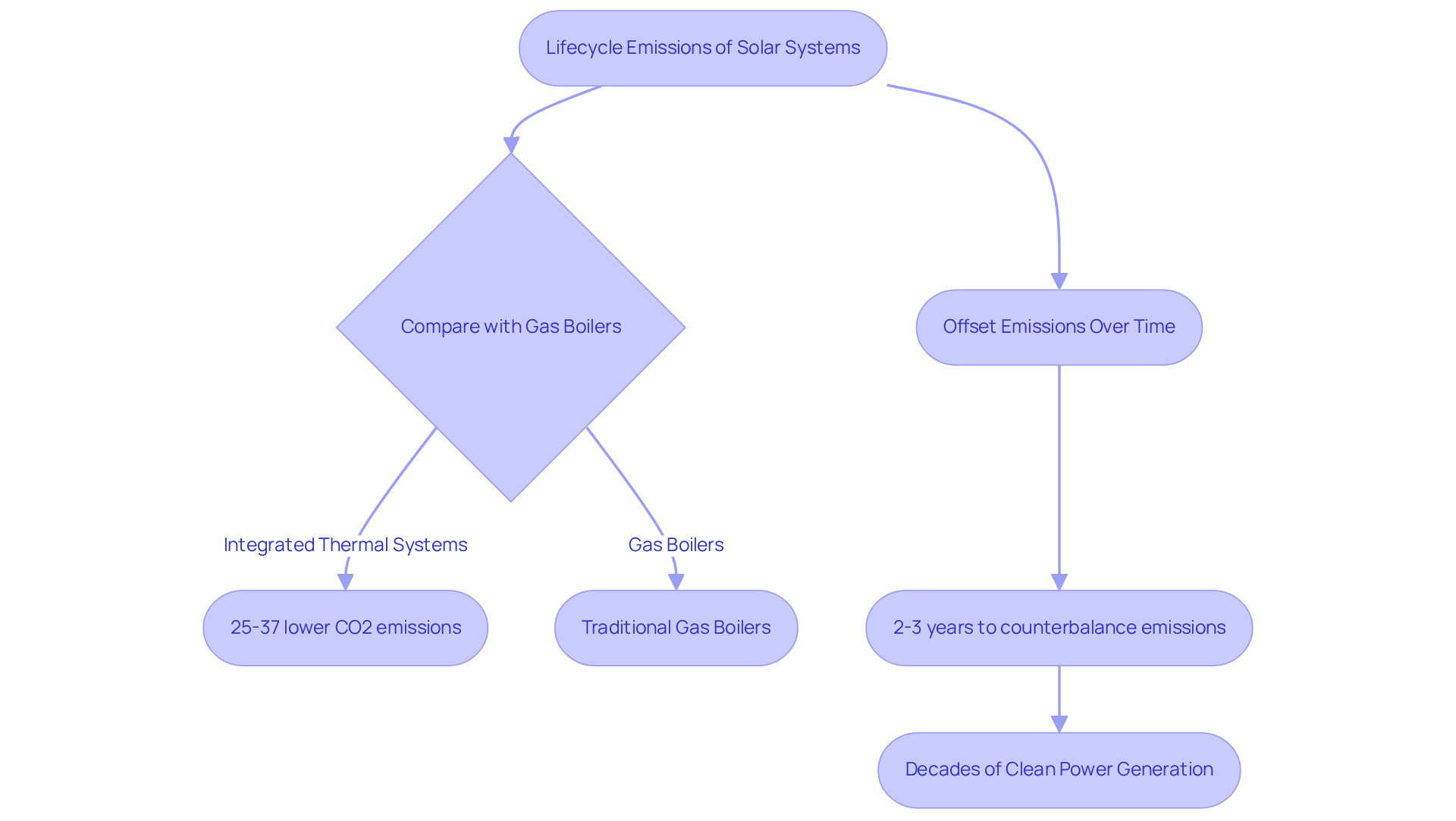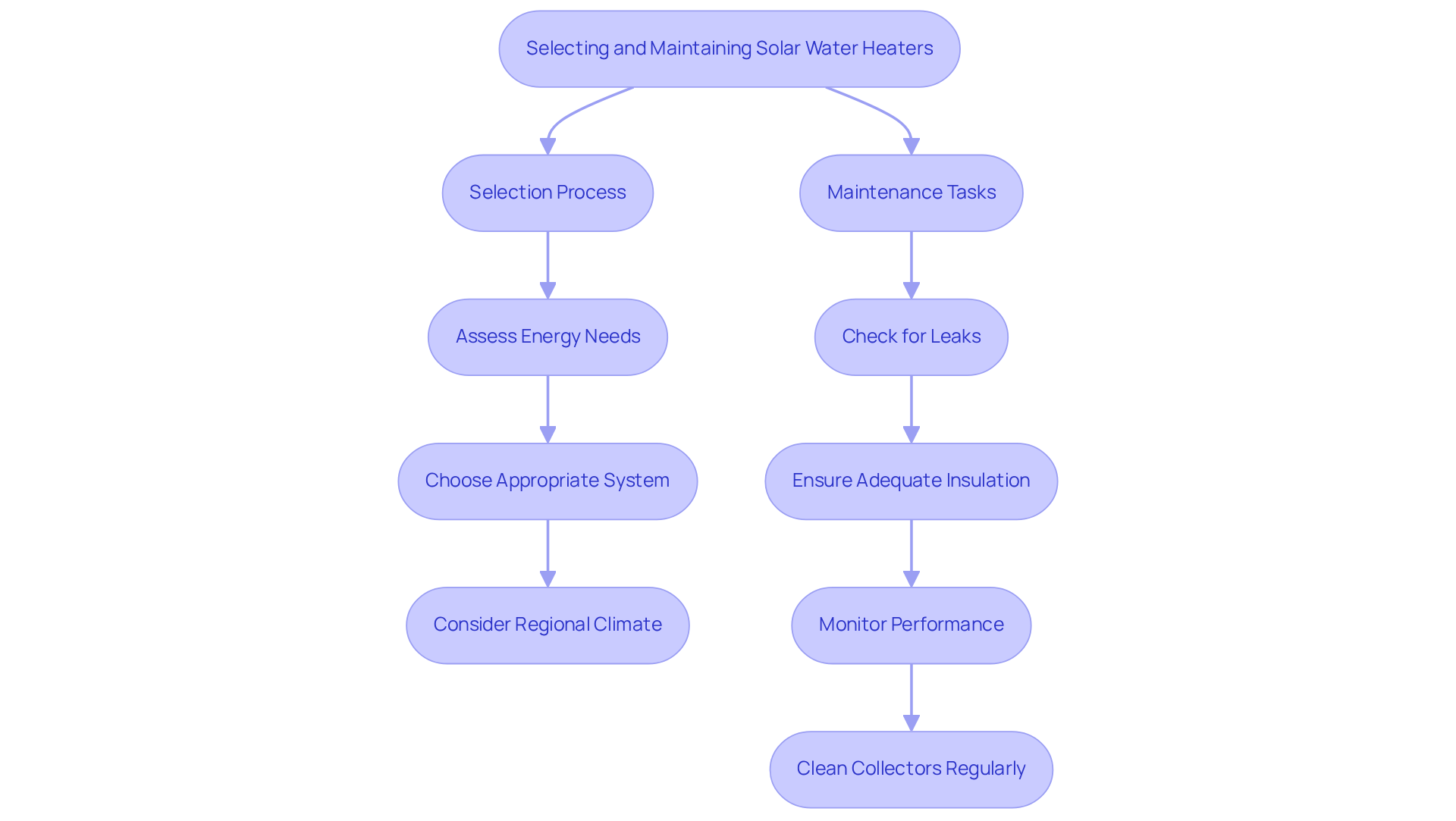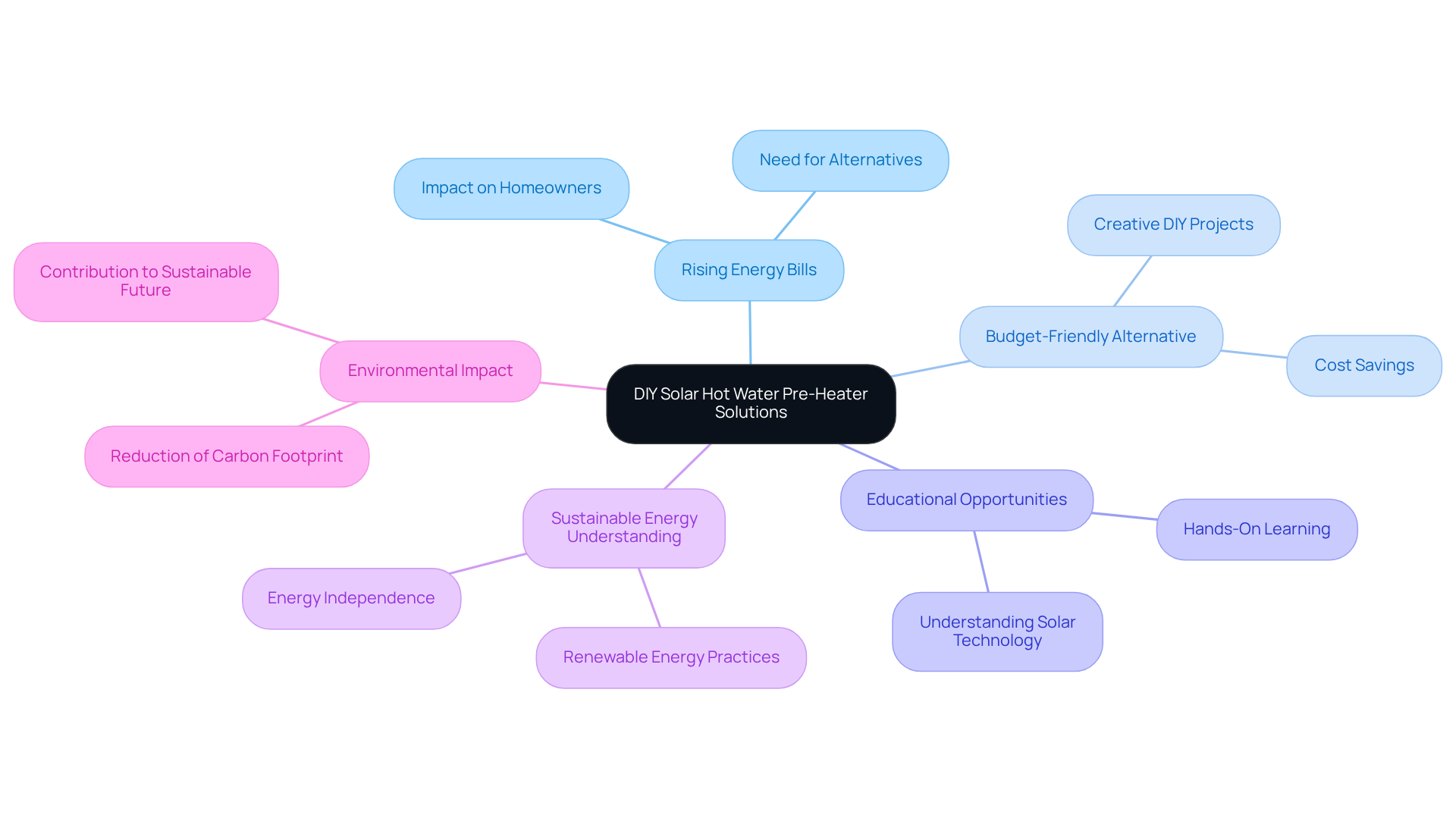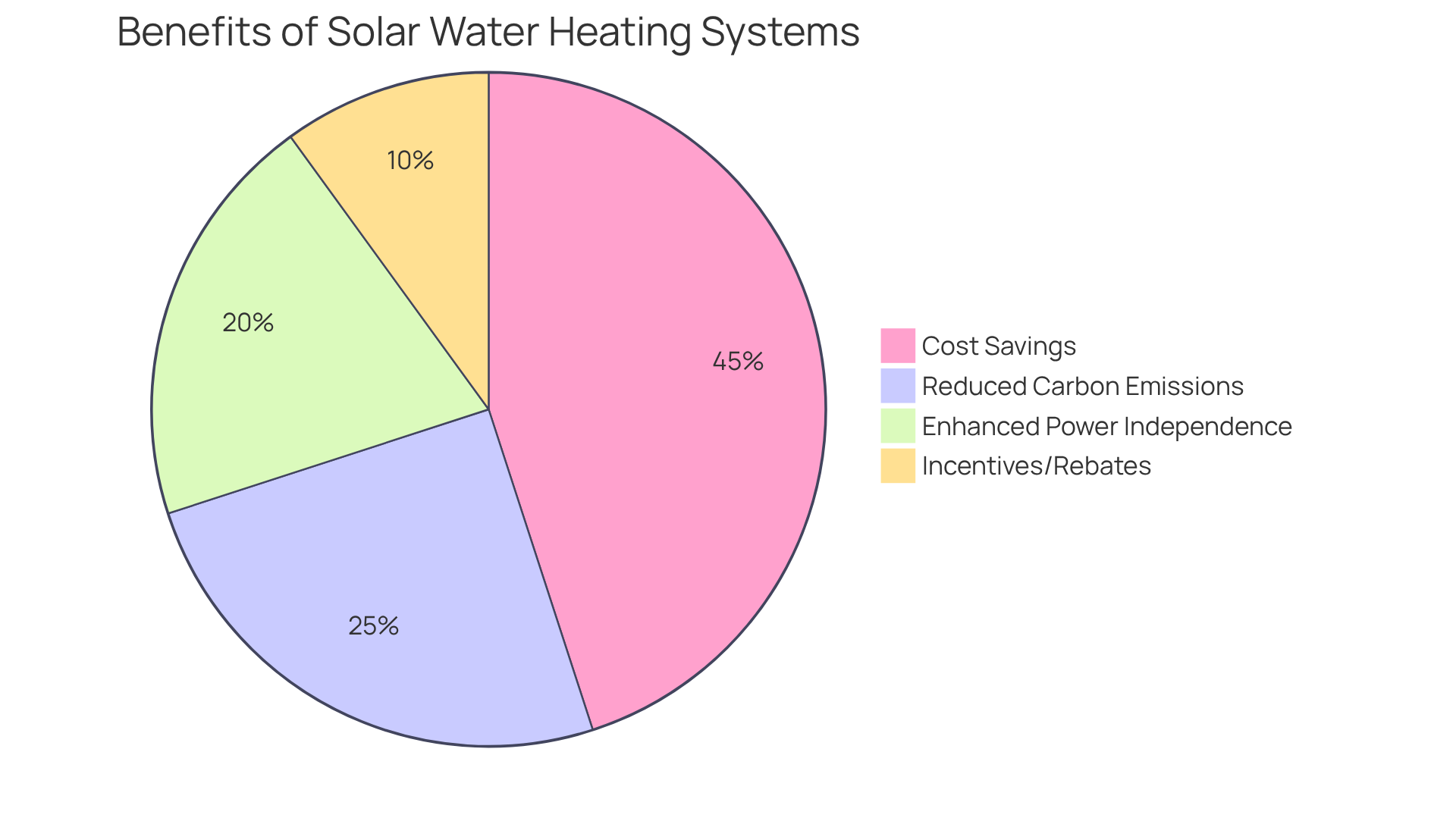Overview
This article speaks directly to eco-conscious homeowners who are concerned about rising energy bills and the impact of their choices on the environment. We understand that managing utility costs can be overwhelming, and that’s why we’re here to share how essential solar hot water services can be a game-changer for your household. By transitioning to solar hot water systems, you not only significantly reduce your utility costs but also lower your carbon emissions, contributing to a healthier planet for future generations.
Many users have reported substantial financial savings after making the switch. Imagine the relief of watching your energy bills shrink while knowing you’re making a positive impact on the environment. It’s common to feel hesitant about such a significant change, but the benefits of embracing renewable energy are compelling. Government incentives further enhance the appeal, making solar hot water systems an attractive investment for those looking to live sustainably.
Together, we can explore these solutions that not only address your immediate financial concerns but also pave the way for energy independence. Let’s work towards a future where you can enjoy the comfort of your home with the peace of mind that comes from knowing you’re making responsible energy choices. If you’re ready to take the next step, we’re here to guide you through the process and answer any questions you may have. Your journey towards sustainable living begins now.
Introduction
As energy costs continue to rise, we understand that eco-conscious homeowners are increasingly seeking sustainable solutions that not only cut expenses but also promote a healthier planet. Solar hot water services present a compelling opportunity for significant savings on utility bills while reducing carbon footprints. However, it’s common to feel overwhelmed by the myriad of options available. How can homeowners navigate the complexities of selecting the right system?
This article explores seven essential solar hot water services that empower homeowners to make informed decisions, ensuring both financial and environmental benefits. Together, we can find the right solution that meets your needs and contributes to a brighter future.
Powercore Electric: Comprehensive Solar Hot Water Solutions
Are you feeling overwhelmed by rising energy bills? At Powercore Electric, we understand the concerns of environmentally conscious homeowners like you. Our range of eco-friendly hot liquid solutions includes solar hot water services designed to harness the sun’s power, providing efficient heating systems that not only reduce costs but also contribute to a healthier planet. With over 30 years of experience serving the California community, we focus on installations that enhance resource savings and dependability.
Imagine the relief of seeing substantial decreases in your utility expenses. Many of our customers report savings of 50% to 80% on water heating bills after making the switch to solar hot water services. This shift not only lessens your utility costs but also helps in reducing your carbon footprint, aligning with the growing demand for solar hot water services and sustainable energy practices.
Industry leaders emphasize the importance of renewable energy. Ramez Naam states, ‘This form of power is going to be absolutely essential to fulfilling increasing power requirements while combating climate change.’ At Powercore Electric, we are committed to personalized service and a community focus, positioning ourselves as your trusted partner in investing in renewable energy solutions such as solar hot water services.
Our customers have shared their positive experiences, with one satisfied client noting, ‘Ryan and his team were great. They were quick, effective, and adhered to the timeline for our energy installation.’ We want you to feel confident in your decision to choose renewable energy. The typical cost of a thermal heating setup is around $9,000 before rebates and incentives, but with the 26% residential investment tax credit, the projected cost drops to approximately $6,300. It’s also important to remember that active setups generally require maintenance every 3-5 years, ensuring long-term efficiency and performance.
For more detailed insights, we invite you to explore the specifications of our various heating solutions, including their capacity, efficiency ratings, and warranty options. Together, we can make . Let’s work towards a sustainable future together—contact Powercore Electric today to learn more about how we can support your journey towards energy independence.
Hawaii Energy: Solar Water Heating Resources and Savings Calculator
We understand that many homeowners are concerned about rising energy bills and are seeking effective solutions. Hawaii Energy offers vital resources to help you navigate your options for heating systems, including a savings calculator that predicts potential savings on your utilities. This tool allows you to assess the financial advantages of transitioning to solar-powered heating systems, which can significantly reduce your utility expenses.
Real-world examples illustrate the efficiency of thermal heating. Homeowners across the U.S. have reported substantial savings on their utility bills after utilizing solar hot water services, showcasing the technology’s potential to enhance both efficiency and sustainability. It’s common to feel overwhelmed by the options available, but rest assured that government incentives and programs are actively promoting a shift toward renewable energy solutions, aligning perfectly with the values of eco-conscious homeowners.
As Dr. Paul Leu notes, “With the federal tax credit, you can recover 30% of your installation’s cost if set up before 2032, and many states provide extra incentives.” Moreover, exploring alternatives such as Tesla home chargers and battery solutions can complement your heating systems and improve overall energy efficiency. By utilizing tools like savings calculators, you can make informed decisions that contribute to both financial savings and environmental responsibility.
Together, we can maximize your benefits by exploring available government incentives and using the savings calculator to assess your . Let’s work towards a more sustainable and financially sound future for your home.
Energy.gov: In-Depth Guide to Solar Water Heater Functionality
At Energy.gov, we understand that many homeowners are concerned about rising energy bills and are seeking ways to alleviate these financial burdens. Our informative guide on solar hot water services offers a nurturing approach to harnessing the sun’s energy. These systems, known as solar hot water services, are designed to capture sunlight through collectors, which transform that sunlight into heat. This heat is then transferred to a liquid stored in a tank, offering a sustainable solution to your energy needs through solar hot water services.
By utilizing complimentary sunlight, solar hot water services can significantly reduce utility expenses, making them an appealing choice for environmentally conscious homeowners. Imagine the relief of seeing lower bills while also contributing to a healthier planet! The effectiveness of sun-powered heaters is underscored by their ability to deliver substantial savings, with many systems achieving impressive performance ratings that reflect their capability to convert sunlight into usable warmth.
As the demand for sustainable energy solutions grows, solar hot water services emerge as a viable option for reducing reliance on traditional energy sources and promoting an eco-friendly lifestyle. When considering a heating system for hot liquid, it’s essential to reflect on key factors such as:
- Your local climate
- Your household’s hot liquid needs
- Your budget
We also encourage you to think about the ease of installation and maintenance, along with the First Hour Rating (FHR), as these metrics are crucial for evaluating performance.
Together, we can explore these options and find the right solution for your home. Let’s work towards a more sustainable future, one step at a time.
EcoWatch: Essential Guide to Solar Water Heaters
Are you feeling overwhelmed by rising energy bills? EcoWatch is here to support you in exploring solar hot water services, which not only provide significant cost savings but also contribute to a healthier planet. These systems can greatly reduce greenhouse gas emissions, making them a compassionate choice for both your wallet and the environment. You have the option to choose between , which harness pumps and controllers for enhanced efficiency, and passive configurations, celebrated for their simplicity and low maintenance needs.
The market today presents a variety of solar water heaters, such as:
- Flat-plate collectors
- Evacuated tube designs
Each with its own unique advantages. Flat-plate collectors are ideal for moderate climates, providing reliable performance, while evacuated tube arrangements shine in colder regions due to their superior insulation capabilities.
When it comes to installation, experiences can vary based on the type of system you select. Active systems may involve more complex installations because of their reliance on electrical components, whereas passive systems typically offer simpler setups. Regardless of your choice, it’s crucial to consider professional installation to ensure optimal performance and longevity of your investment.
By understanding the different types of heating systems, including solar hot water services and their benefits, you can make informed decisions that align with your goals for energy efficiency. Together, we can work towards a sustainable future, empowering you to take control of your energy use and reduce those daunting bills. If you have questions or need guidance, please don’t hesitate to reach out—we’re here to help you every step of the way.
MarketWatch: Pros and Cons of Solar Water Heaters
We understand that rising energy bills can be a significant concern for homeowners. MarketWatch provides a thoughtful examination of thermal heaters, highlighting both their advantages and challenges to help you make an informed decision. Imagine the possibility of saving between 50% to 80% on your heating costs. Not only can thermal heaters lead to substantial savings on energy expenses, but they also reduce our reliance on fossil fuels, contributing to a smaller carbon footprint. Additionally, these systems require minimal upkeep, making them an appealing choice for those who care about the environment.
However, it’s common to feel apprehensive about the initial investment, which can range from $1,700 to $5,500. This upfront cost may deter some homeowners from making the switch. Furthermore, the efficiency of photovoltaic heating systems relies on the availability of sunlight, meaning their performance can fluctuate with seasonal changes.
This balanced overview offers essential insights for homeowners to evaluate whether a thermal heater aligns with their energy needs and financial goals. Together, we can explore as sustainable energy solutions that not only meet your requirements but also contribute to a greener future. If you’re interested in learning more about how thermal heaters can support your journey towards energy independence, let’s connect and discuss your options.
Drawdown.org: Co-Benefits and Impact of Solar Hot Water Systems
We understand that can be a significant concern for homeowners. The co-benefits of heating installations extend beyond personal savings; they play a crucial role in improving air quality and decreasing carbon emissions. By adopting renewable heat systems, you not only decrease your energy expenses but also contribute to a considerable decrease in greenhouse gas emissions. For instance, widespread adoption of these systems could prevent approximately 52 million metric tons of carbon dioxide pollution annually, equivalent to the emissions from nearly 10 million cars.
Real-world examples illustrate this transition: homeowners who have transitioned to renewable water heating report substantial savings and a commitment to sustainable living. This shift not only promotes energy independence but also aligns with broader environmental goals, such as reducing reliance on fossil fuels and improving local air quality. The incorporation of renewable energy technology in home environments promotes a cleaner ecosystem, demonstrating how our personal efforts can together address climate change.
Furthermore, the co-benefits of solar hot water services include increased property values and possible tax incentives, making them a desirable choice for environmentally aware homeowners. As communities adopt these technologies, they play a part in a broader movement towards sustainable practices, emphasizing the significance of renewable solutions in realizing a more environmentally friendly future. Together, we can make a difference and work towards a sustainable future.
Carbon Leadership Forum: Upfront Embodied Carbon of Solar Systems
We understand that many homeowners are concerned about rising energy bills and the impact of their choices on the environment. The Carbon Leadership Forum highlights the importance of embodied carbon in photovoltaic installations, which includes the total greenhouse gas emissions from the production, transportation, and installation of solar technology. This knowledge empowers you to make informed decisions about your heating solutions, including solar hot water services, as it encompasses not just operational emissions but the entire lifecycle emissions of your water heating options. For instance, recent data indicates that integrated thermal systems can achieve 25-37% lower CO2 emissions compared to traditional gas boilers. This awareness is vital for eco-conscious homeowners like you, who are committed to reducing their overall carbon footprint.
It’s common to feel uncertain about the emissions related to photovoltaic panels. Experts note that while these panels do have associated emissions during their production, they typically offset these within just a few years of operation, leading to decades of clean power generation. As Sam Wigness points out, “Depending on your local electricity mix, it usually takes 2-3 years for photovoltaic panels to counterbalance their life-cycle emissions, resulting in decades of clean power generation, water conservation, and cost savings on utilities.” By considering both the initial embodied carbon and the long-term benefits of photovoltaic technology, you can contribute to a sustainable energy future.
To enhance your understanding and explore your options, we encourage you to consult with a in Stockton, California. They can help you assess the lifecycle emissions of different systems and suggest panels that perform well in cloudy conditions. Furthermore, consider reaching out for recommendations on trustworthy energy companies in your area to ensure you make an informed choice. Together, we can work towards a brighter, more sustainable future.
Energy.gov: Selecting and Maintaining Solar Water Heaters
We understand that can be a significant concern for homeowners. Selecting and maintaining solar hot water services is not just a choice; it’s a crucial step towards maximizing efficiency and ensuring a long-lasting investment in your home. By choosing setups tailored to your specific needs and regional climate conditions, you take an important step towards energy independence.
Routine upkeep is essential, and it involves simple yet effective methods such as:
- Checking for leaks
- Ensuring adequate insulation
- Monitoring performance
Experts recommend conducting visual inspections and cleaning collectors regularly to prevent debris buildup, which can hinder efficiency. It’s common to feel overwhelmed by these tasks, but maintaining the integrity of heat transfer fluids and ensuring backup systems are operational during peak demand periods is vital for optimal performance.
By adhering to these best practices, you can guarantee long-term contentment with your solar hot water services. Together, we can aid in cost savings and ecological sustainability, ensuring that your home remains a haven of comfort and efficiency. Let’s work towards a brighter, more sustainable future for our homes and communities.
Endless Sphere: DIY Solar Hot Water Pre-Heater Solutions
We understand that can be a significant concern for many homeowners. Endless Sphere offers creative DIY solutions for solar hot water services, empowering you to harness sunlight independently. These projects not only serve as a budget-friendly alternative to conventional heating methods but also present valuable educational opportunities regarding solar hot water services. By engaging directly with renewable power technology, you can deepen your understanding of sustainable energy and solar hot water services while actively reducing your reliance on traditional heating sources. Together, we can enhance your knowledge and promote energy independence.
Imagine the satisfaction of building your own system, knowing that you are making a positive impact on both your finances and the environment. This practical approach aligns with the growing trend among homeowners who seek to participate in renewable initiatives. By taking these steps, you are not only improving your own independence but also contributing to a sustainable future for all.
Let’s work towards a brighter tomorrow, where you can feel confident in your energy choices. If you’re ready to explore these empowering solutions, we’re here to support and guide you every step of the way.
Hawaii Energy: Benefits of Switching to Solar Water Heating
At Hawaii Energy, we understand that many homeowners are concerned about rising energy bills. Switching to thermal heating systems can significantly alleviate these worries, offering considerable cuts in utility costs, reduced carbon emissions, and enhanced power independence. Imagine saving substantially on your utility bills while also contributing to a more sustainable future. For instance, a photovoltaic arrangement with a renewable resource factor (SEF) of 2.5 can conserve roughly 174 therms each year, which translates to around $261 in annual savings.
With various incentives and rebates currently available, including a worth 30% of the installed equipment cost, transitioning to renewable water heating is not just an environmentally responsible choice—it’s also a financially advantageous one. Furthermore, you can explore alternative renewable power options, such as Tesla home chargers and efficient panels, which can further enhance your efficiency and sustainability.
Many homeowners have shared their positive experiences, highlighting the economic advantages of these systems and how they lead to impressive savings over time. As the demand for renewable energy solutions continues to grow, solar hot water services emerge as a practical and appealing option for eco-conscious homeowners. Together, we can work towards a more sustainable future, ensuring that your energy choices align with your values and financial goals.
Conclusion
Switching to solar hot water services is a significant step toward alleviating your energy costs and nurturing our environment. We understand that managing utility bills can be a concern, and by harnessing the sun’s energy, you can not only enjoy substantial savings but also contribute to a healthier planet. This article highlights various providers and resources, emphasizing the comprehensive benefits and practical insights necessary for making informed decisions about solar hot water systems.
Key points discussed include:
- The impressive savings potential reported by users.
- The variety of solar heating systems available.
- The importance of understanding both the initial investment and long-term benefits.
With resources from Powercore Electric, Hawaii Energy, and other experts, you can access valuable tools, such as savings calculators and maintenance tips, to optimize your solar hot water systems and ensure they meet your specific needs.
Ultimately, embracing solar hot water services transcends mere financial considerations; it represents a commitment to a sustainable future. By exploring these eco-friendly options, you can play a crucial role in reducing carbon emissions and promoting renewable energy. Together, let’s take the first step towards energy independence and sustainability by considering solar hot water solutions that align with both your financial goals and environmental values.


